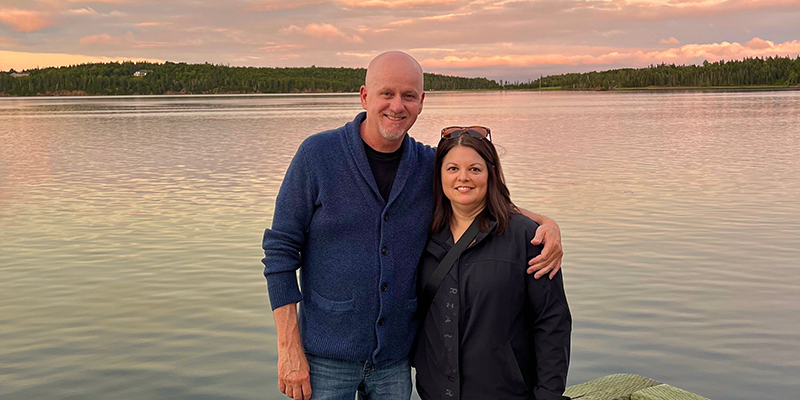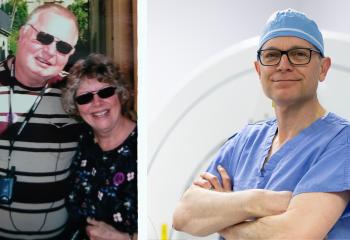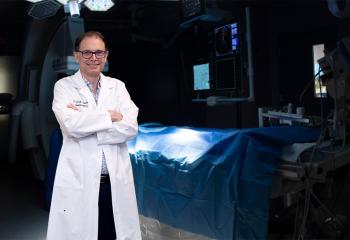
Pictured: Kevin with his wife, Marie. After he was diagnosed with a tennis-ball sized tumour through the care of his Guysborough family doctor, Kevin received four life-saving brain surgeries at the QEII Health Sciences Centre.
When Kevin Rainey and his wife, Marie, moved from Langley, British Columbia to retire in the tiny village of Guysborough, Nova Scotia, they had no idea that our province’s skilled healthcare professionals – from care teams in rural hospitals to the highly specialized QEII Health Sciences Centre – would soon save Kevin’s life.
For years, Kevin faced relentless sinus troubles, going through box after box of tissues and trying every nasal spray that physicians recommended.
In November 2023, during a routine doctor’s visit, Kevin’s family physician in Guysborough, Dr. Jean-Marie Benjamin, paused him on the way out to ask if he’d ever had a CT scan. He hadn’t. She immediately – and worriedly – booked one for the very next day.
The scan revealed a shocking issue. A tennis-ball sized brain tumour, known as a meningioma, was wedged between two hemispheres in Kevin’s brain.
“One would think the medical horsepower I had access to in [previous locations like] Ontario and B.C. would be able to get to the root of my problem,” Kevin says.
“But it was the littlest of regional hospitals and my wonderful family doctor in Nova Scotia who discovered it.”
Transferred to receive specialized care at the QEII Health Sciences Centre in Halifax, Kevin met neurosurgeon Dr. David Clarke.
“I had the best people taking care of me,” Kevin recalls. “Dr. Clarke is so knowledgeable with a very calming presence. I knew that I was in good hands.”
Kevin’s first craniotomy, a surgery performed through an opening in the skull, was expected to last three hours. Instead, Dr. Clarke spent nearly nine hours rebuilding the entire bottom of Kevin’s skull, which the tumour had silently eroded over time.
“The only thing that had been holding in my brain and spinal fluid was that tumour,” Kevin explains.
Kevin and Marie say that the care received from the QEII went far beyond exceptional talent in the operating room, delivering personalized feedback during every step of the care journey.
During post-surgical recovery at home, Kevin and Marie became concerned about complications. They sent Dr. Clarke a photo of the surgical incision site. He only needed one look to identify a serious problem.
“He knew right away that I had a dangerous infection in my brain. And told us to come back to the QEII right away,” says Kevin.
A second craniotomy, an 18-week course of twice-daily IV antibiotics, and two further endoscopic endonasal surgeries, a type of brain surgery performed through the nose, followed.
Through each surgery and setback, Kevin felt his fellow Nova Scotians rally around him with warm hospitality.
“During winter, before the crack of dawn, our neighbours were up in there digging us out and shoveling. They would drive me down to the local hospital without even asking.”
From receiving local care like the twice-a-day IV antibiotics at Guysborough Memorial Hospital, to complex neurosurgeries and an essential peripherally inserted central catheter (PICC) line placement at the QEII, Nova Scotia’s healthcare system rose to help Kevin meet every medical challenge he faced.
Kevin, who has lived coast-to-coast from B.C. to Ontario, up to Labrador and as far south as Peru, says the care he’s received in Nova Scotia has been incredible and by far the most personalized and heartfelt.
He is especially impressed with the layout of Nova Scotia’s healthcare infrastructure, with small community hospitals “peppered throughout the province” providing basic and essential local care, and the QEII offering highly specialized care for complex cases.
“The medical system in Nova Scotia works. We do an amazing job here,” says Kevin.
And he shares that positive outlook whenever and wherever he can.
Today, Kevin describes himself as “a bit weaker” but in good health, with the only lasting complication from surgery being the loss of his sense of smell. He is monitored through regular check-ups and is set to visit the QEII at the end of July.
Kevin shares that one of the biggest ways his healthcare journey affected him was that it truly re-centered his life priorities.
“When you’re lying on the operating table alone, you’re not worried about the wrong things. You don’t fret about bank accounts, RRSP’s, social standings; your heart and mind become laser-focused on what really matters – the wonderful voice of loved ones, friends, family members and time shared with them.”
Thanks to the incredible care he received, Kevin is enjoying precious time with his loved ones – including his wife Marie, daughter Nessa, and son Sean, while being surrounded by an uplifting community and healthcare professionals he now refers to as dear friends.
“If the tumour wasn’t discovered and the QEII did not do what they do, very well, I wouldn’t be here right now. That is a fact,” Kevin says.
He’s grateful for this life-saving care and for his rediscovered perspective on what matters most to him in life.
“We’re all going to exit out the same door of this life at some point. The only question is when. My happy ending is becoming myself again.”

